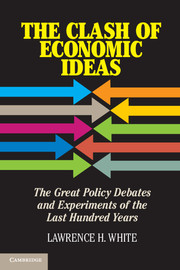Book contents
- Frontmatter
- Contents
- Figures
- Acknowledgments
- Introduction
- 1 The Turn Away from Laissez-Faire
- 2 The Bolshevik Revolution and the Socialist Calculation Debate
- 3 The Roaring Twenties and Austrian Business Cycle Theory
- 4 The New Deal and Institutionalist Economics
- 5 The Great Depression and Keynes’s General Theory
- 6 The Second World War and Hayek’s Road to Serfdom
- 7 Postwar British Socialism and the Fabian Society
- 8 The Mont Pelerin Society and the Rebirth of Smithian Economics
- 9 The Postwar German “Wonder Economy” and Ordoliberalism
- 10 Indian Planning and Development Economics
- 11 Bretton Woods and International Monetary Thought
- 12 The Great Inflation and Monetarism
- 13 The Growth of Government
- 14 Free Trade, Protectionism, and Trade Deficits
- 15 From Pleasant Deficit Spending to Unpleasant Sovereign Debt Crisis
- Index
- References
1 - The Turn Away from Laissez-Faire
Published online by Cambridge University Press: 05 June 2012
- Frontmatter
- Contents
- Figures
- Acknowledgments
- Introduction
- 1 The Turn Away from Laissez-Faire
- 2 The Bolshevik Revolution and the Socialist Calculation Debate
- 3 The Roaring Twenties and Austrian Business Cycle Theory
- 4 The New Deal and Institutionalist Economics
- 5 The Great Depression and Keynes’s General Theory
- 6 The Second World War and Hayek’s Road to Serfdom
- 7 Postwar British Socialism and the Fabian Society
- 8 The Mont Pelerin Society and the Rebirth of Smithian Economics
- 9 The Postwar German “Wonder Economy” and Ordoliberalism
- 10 Indian Planning and Development Economics
- 11 Bretton Woods and International Monetary Thought
- 12 The Great Inflation and Monetarism
- 13 The Growth of Government
- 14 Free Trade, Protectionism, and Trade Deficits
- 15 From Pleasant Deficit Spending to Unpleasant Sovereign Debt Crisis
- Index
- References
Summary
At England’s stately University of Cambridge in fall 1905, a clever postgraduate mathematics student named John Maynard Keynes began his first and only course in economics. He would spend eight weeks studying under the renowned Professor Alfred Marshall. During the summer Keynes had read the then-current (third) edition of Marshall’s Principles of Economics, a synthesis of classical and new doctrines that was the leading economics textbook in the English-speaking world. Marshall was soon impressed with Keynes’s talent in economics. So was Keynes himself. “I think I am rather good at it,” he confided to an intimate friend, adding, “It is so easy and fascinating to master the principle of these things.” A week later he wrote: “Marshall is continually pestering me to turn professional Economist.”
At an Austrian army encampment on the bank of the Piave River in northern Italy during the last months of the First World War, a lull in combat gave a young lieutenant named Friedrich August von Hayek the chance to open his first economics texts (not counting the socialist pamphlets he had read during college), two books lent to him by a fellow officer. He later wondered why the books had not given him “a permanent distaste for the subject” because they were “as poor specimens of economics as can be imagined.” Returning to the University of Vienna after the war, the young veteran “really got hooked” on economics when he discovered a book by the retired professor Carl Menger. Menger’s Principles of Economics (Grundsätze der Volkswirtschaftslehre) of 1871 had colaunched a marginalist-subjectivist revolution in economic theory, a revolution that provided the new ideas in Marshall’s synthesis. Hayek found it “such a fascinating book, so satisfying.”
- Type
- Chapter
- Information
- The Clash of Economic IdeasThe Great Policy Debates and Experiments of the Last Hundred Years, pp. 12 - 31Publisher: Cambridge University PressPrint publication year: 2012
References
- 1
- Cited by



